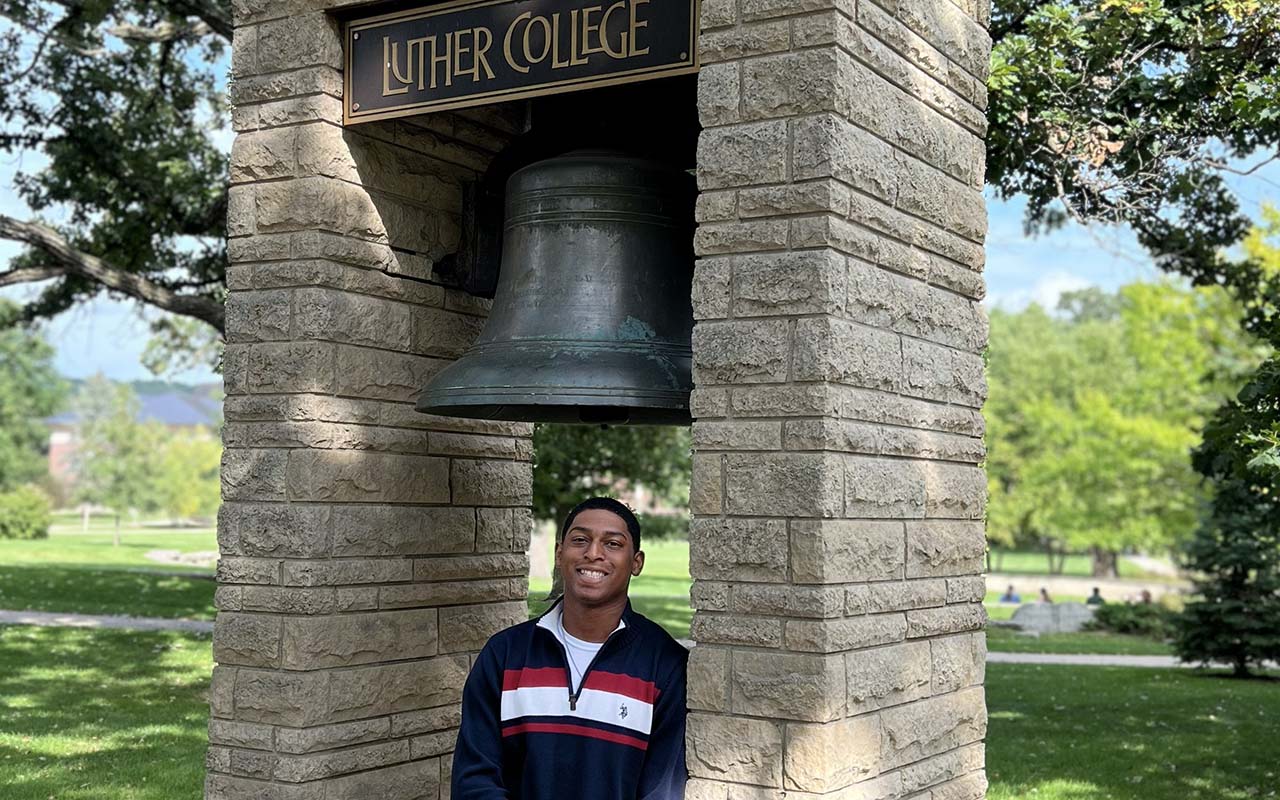College Lingo 101: Key Terms You Should Know

Students walk past the Luther College bell.
Starting college comes with a lot of unfamiliar terms. Financial aid lingo and academic jargon can be very confusing at first. Understanding the language used in college settings can make your transition to higher education smoother and less overwhelming.
Financial Aid Terms to Know
Award Letter: Once you’ve submitted your FAFSA and have been accepted to a school, you will receive an award letter. It explains what financial aid you are eligible for.
COA (Cost of Attendance): The estimated cost of going to college, including tuition, room and board, books, etc.
Default: In reference to loans, failing to repay a loan according to the terms agreed upon.
FAFSA (Free Application for Federal Student Aid): This is the form you fill out to apply for federal financial aid, including grants, loans, and work-study. You’ll need to submit it every year.
Grants: Another type of financial aid you do not need to repay. It is usually awarded based on financial need.
Loans: Borrowed money you’ll need to pay back with interest. There are three main types:
- Subsidized Loans: A federal loan. Interest doesn’t start accruing until you leave school and 6 months have passed.
- Unsubsidized Loans: A federal loan. Interest starts accruing as soon as the loan is taken out.
- Private Loans: Offered by banks or lenders, often with extremely high interest rates and few repayment protections.
Net Price: The actual amount you pay after financial aid is applied.
SAI (Student Aid Index): Used to determine your eligibility for federal aid based on your financial situation.
SAP (Satisfactory Academic Progress): Standards you must meet to keep receiving financial aid. It’s usually determined by a set minimum GPA and course completion rate.
Scholarship: Money awarded to you that you don’t have to pay back. Scholarships can be based on academic merit, artistic talents, athleticism, financial need, etc.
Tuition: The cost of your classes (not including housing, books, meal plans, etc.)
Work-Study: A federal program that lets you work part time to help pay for school. The jobs are often on campus and flexible with your class schedule.
Academic Terms to Know
Academic Advisor: A staff or faculty member who helps you choose classes, plan your degree path, and stay on track to graduate.
Academic Probation/Dismissal: If your GPA falls below a certain level, you may be placed on academic probation. If you don’t improve your performance in the coming semester, it can lead to dismissal from the college.
Audit: Taking a class for no grade or credit, just to learn. This is great if you’re curious about a subject but don’t need it for your degree.
Bachelor’s, Master’s, PhD:
- Bachelor’s Degree: A 4-year undergraduate degree.
- Master’s Degree: A graduate degree that takes 1–2 years to complete, after a bachelor’s.
- PhD: The highest academic degree, involving several years of research and a dissertation.
Capstone: A final project or course that integrates what you’ve learned in your major.
Commencement: A formal ceremony at the end of the academic year to celebrate graduates.
Convocation: A formal ceremony at the beginning of the academic year.
Credit Hour: Courses are measured in credit hours. You’ll need a certain amount to graduate (Usually 120 for a bachelor’s degree).
CR/NC (Credit/No Credit): Instead of a letter grade, some classes allow you to earn credit (pass) or no credit (fail). These don’t affect your GPA.
Elective: A class you choose to take that isn’t specifically required for your major.
Gen Ed (General Education): Core courses required for all students, regardless of their major.
Grade Forgiveness: Some schools allow you to retake a class and replace the previous grade in your cumulative GPA.
Incomplete: If you can’t finish a course due to serious circumstances beyond your control, you may be granted an “incomplete” for a class and will be able to finish the coursework later.
Internship: Hands-on work experience related to your field of study, typically unpaid.
Major/Minor: Your main area of study (major) and your secondary focus (minor). Minors are optional.
Prerequisite: A course you must complete before enrolling in a more advanced one.
Registrar: The office that manages class registration, transcripts, and academic records.
Syllabus: The document your professor gives you at the start of a course. It will outline assignments, grading and attendance policies, important dates, and general expectations of you for the course.
TA (Teaching Assistant): Graduate or high-achieving students who help professors with grading, leading discussions, and/or tutoring.
Transcript: An official record of all your courses, grades, and GPA. You’ll need this when applying or transferring to schools.
Campus Life & Support Terms to Know
Career Services: Office that helps with resumes, interview prep, and job placement.
Coed: Refers to mixed-gender housing.
Disability Services: Provides accommodations for students with physical, mental, or learning disabilities.
First-Generation Student: A student who is the first in their family to attend college. Colleges often have programs like TRIO to help support these students.
Greek Life: Fraternities and sororities. Often named with Greek letters.
Learning/Writing Center: Free help with tutoring, writing, and studying.
Office Hours: Scheduled times when professors are available to meet with students.
RA (Resident Assistant): A student leader in the dorms who supports students and enforces rules.
Student Government: Elected student leaders who represent the student body.
Related Posts

Each year, Luther College offers an outdoor pre-orientation program called Endeavor Together. This program helps new Luther students build community, confidence and a sense of belonging before the fall semester begins.

If you are the first in your family to attend college and have the goal of completing your college degree, you are facing a lot of transitions in life. On Friday, Nov. 7, 2025, first-generation college student Geremiah Brown ’26 spoke for the Luther chapel service. Inside College Admissions brings you his story to encourage you in your college journey.
Admissions Office
Luther College
700 College Drive
Decorah, Iowa 52101
Phone: 563-387-1287